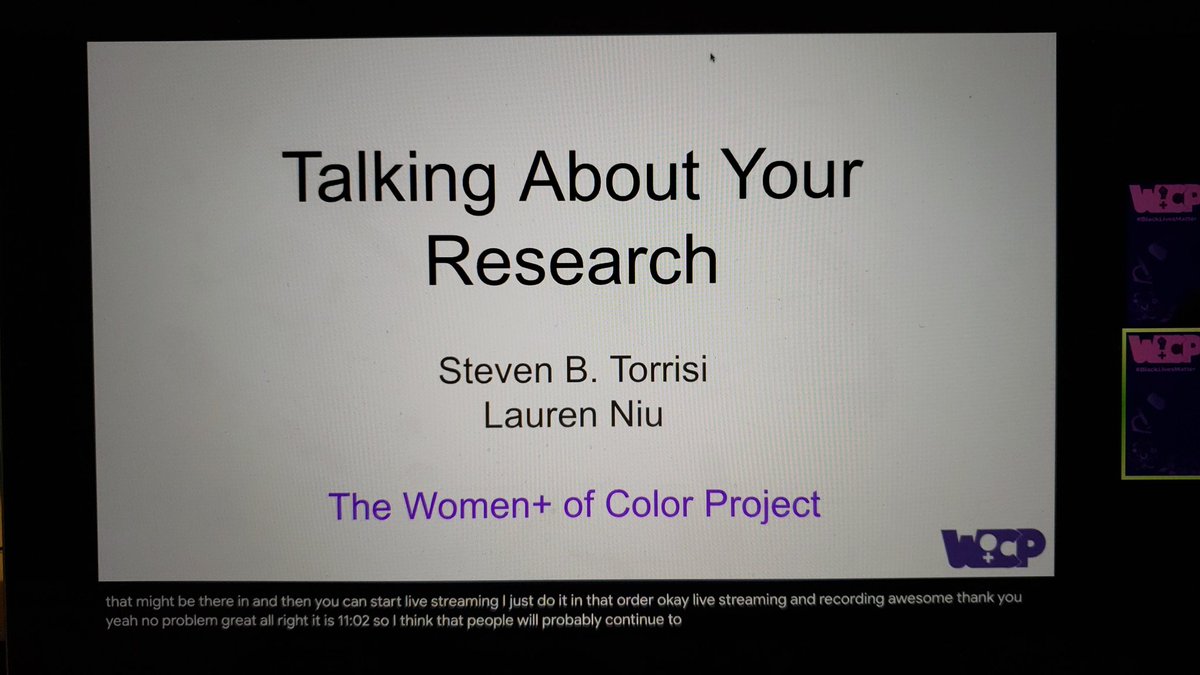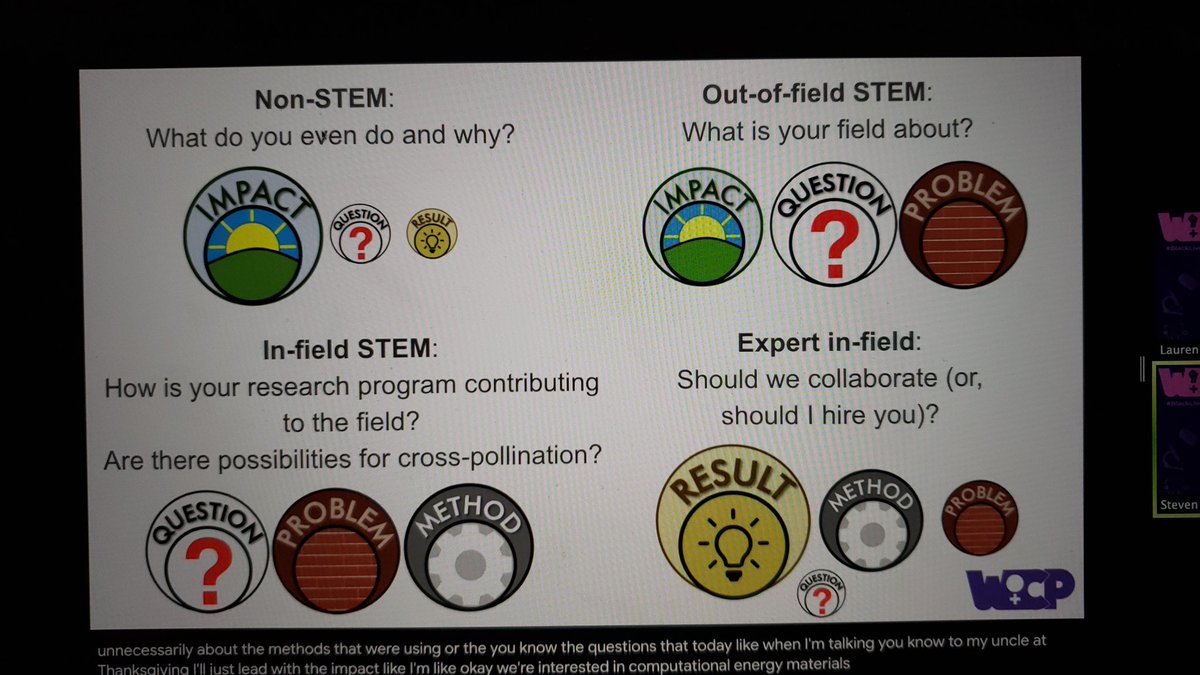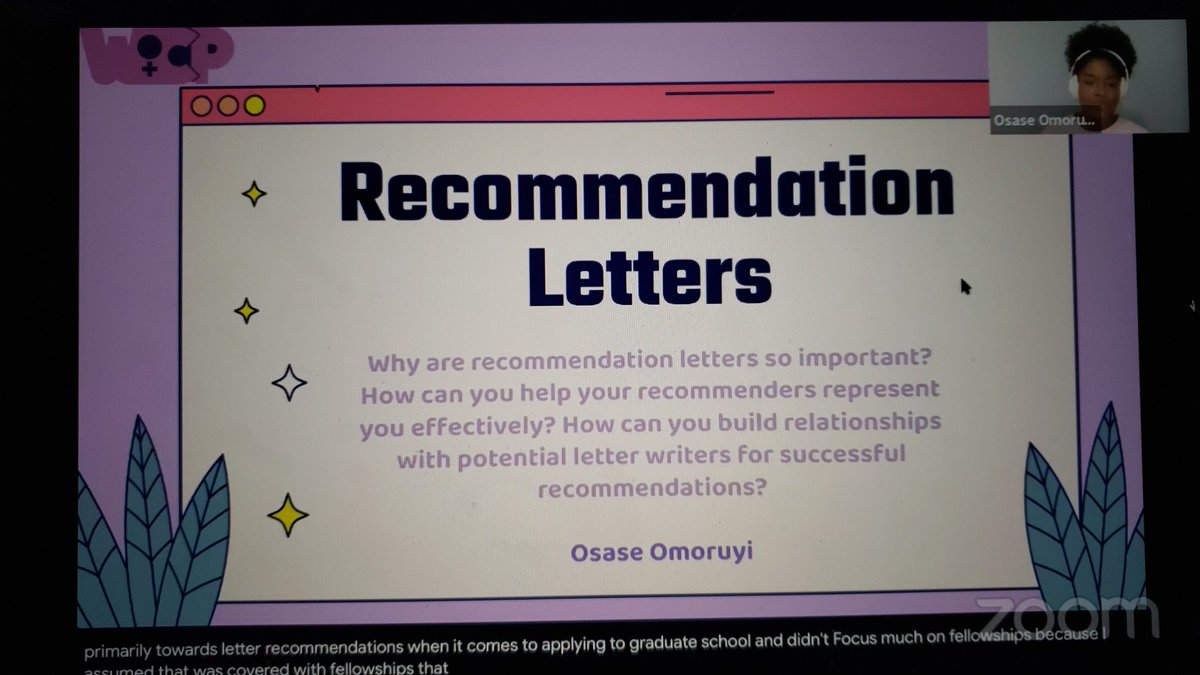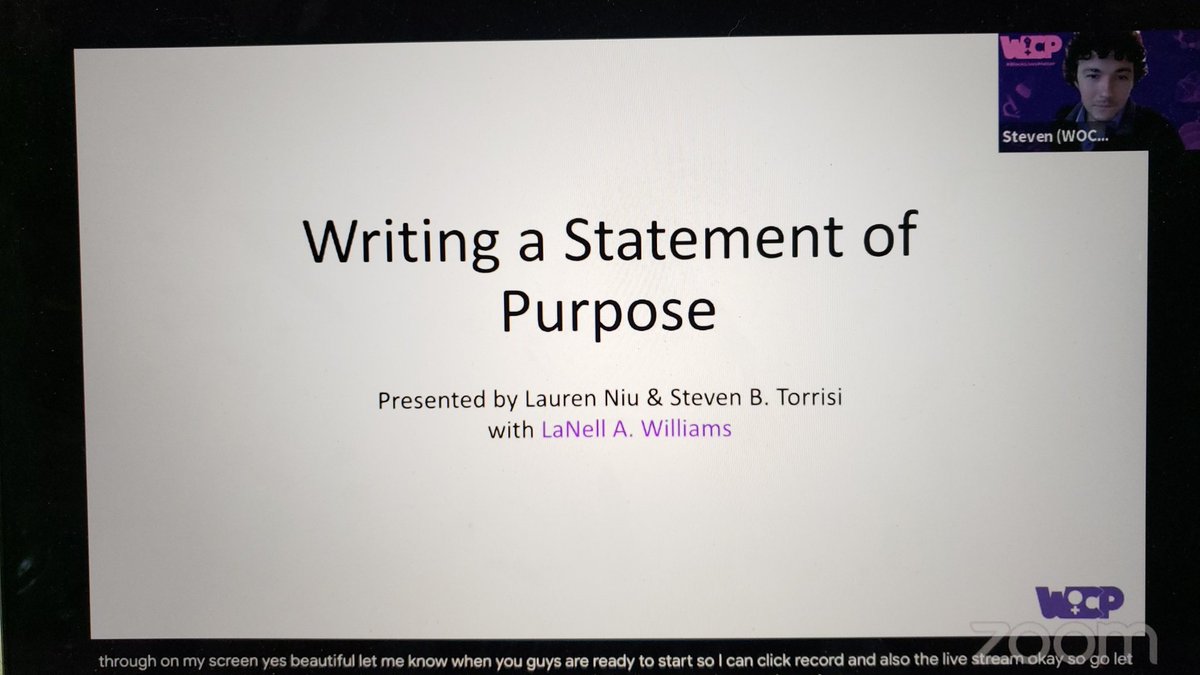
To kick off the second day of the Grad School 101 Workshop we welcome back Steven B. Torrisi and Lauren Niu!
#wocproject2020 #graduateschool
#wocproject2020 #graduateschool

Talking about research is a different skill set from doing your research!
Communication is universally transferable!
-conference talks, papers, twitter threads, etc.
Communication is universally transferable!
-conference talks, papers, twitter threads, etc.
Usual Caveats:
-there is no one way to be a successful communicator!
-there are many different styles as there are people
Our goal is to structure and help scaffold your voice, ideas and style!!
-there is no one way to be a successful communicator!
-there are many different styles as there are people
Our goal is to structure and help scaffold your voice, ideas and style!!
Inagine you're visiting the school of your dreams and you get asked what you've worked on in the past.
What do you do? What do you answer?
Here's a possible answer and things we could tidy up in the answer.
What do you do? What do you answer?
Here's a possible answer and things we could tidy up in the answer.

5 Core components:
Before we talk about talking about your research, let's talk about your research!
What question does your research answer?
Many research programs can be condensed into five core components!
Before we talk about talking about your research, let's talk about your research!
What question does your research answer?
Many research programs can be condensed into five core components!
What motivates your research area?
What is the field working towards?
What would be the outcome for the world if the research was successful 5 years out?
Why should Congress fund your research?
These are all examples of questions and things to think about research.
What is the field working towards?
What would be the outcome for the world if the research was successful 5 years out?
Why should Congress fund your research?
These are all examples of questions and things to think about research.
The first core component is impact!
The second core component is question:
What is the main thing you are trying to learn?
What is the underlying cause of phenomena?
What do we want to measure?
What is the hypothesis we want to test?
The second core component is question:
What is the main thing you are trying to learn?
What is the underlying cause of phenomena?
What do we want to measure?
What is the hypothesis we want to test?
Third component is the problem:
Why has nobody thought of it, or done it yet?
Why is the current methodology not good enough to answer the question?
*The reason why we can't go and answer the question right now*
Why has nobody thought of it, or done it yet?
Why is the current methodology not good enough to answer the question?
*The reason why we can't go and answer the question right now*
The fourth component is the method:
What do you do that is new that solves the problem?
What new tools are you creating or adapting from diff areas?
*This captures most of your day-to-day work!*
It's usually the aspect that differentiates you and your team from other scientists!
What do you do that is new that solves the problem?
What new tools are you creating or adapting from diff areas?
*This captures most of your day-to-day work!*
It's usually the aspect that differentiates you and your team from other scientists!
Fifth component is the result:
What we learned today/the moral of the story
What we know now that we didn't before?
What did we measure, understand, calculate?
What we learned today/the moral of the story
What we know now that we didn't before?
What did we measure, understand, calculate?
Tips and Tricks:
-Know your audience
How much time do they have?
How much technical detail do they want?
Are they interested in your field? Your project or your group? You as a potential colleague?
-Know your audience
How much time do they have?
How much technical detail do they want?
Are they interested in your field? Your project or your group? You as a potential colleague?
Tips and Tricks:
-Jargon
Not all jargon is bad!
It's ok to ask whether they know the jargon!
Think about what the last 'shared education' you had with your audience.
-Jargon
Not all jargon is bad!
It's ok to ask whether they know the jargon!
Think about what the last 'shared education' you had with your audience.
Tips and Tricks:
-Check in with your audience
It's ok to ask if they're tracking or if they're familiar with the subject!
It's not their job to understand you: it's your job to enlighten them!
Explain by analogy
DON'T : teach the subject
DON'T : run away with rapid-fire jargon
-Check in with your audience
It's ok to ask if they're tracking or if they're familiar with the subject!
It's not their job to understand you: it's your job to enlighten them!
Explain by analogy
DON'T : teach the subject
DON'T : run away with rapid-fire jargon
Tips and Tricks:
-Speculation vs Concrete Claims
The best science occurs on the blurry margin of what is and isn't known
Getting great ideas/insights
The catch: not always on the same page about when to speculate and when to trot out cold facts
'I don't know' will set you free
-Speculation vs Concrete Claims
The best science occurs on the blurry margin of what is and isn't known
Getting great ideas/insights
The catch: not always on the same page about when to speculate and when to trot out cold facts
'I don't know' will set you free
Tips and Tricks:
-Avoiding too much humility
It's ok that the big picture sell is not necessarily the same thing that keeps you occupied on a day to day basis!
Own it! Own your work, own your contributions!
-Avoiding too much humility
It's ok that the big picture sell is not necessarily the same thing that keeps you occupied on a day to day basis!
Own it! Own your work, own your contributions!
Tips and Tricks:
-Getting to Carnegie Hall
All science communications is a practice
Aggressively seek out opportunities to exercise this skill and get better
Get constructive feedback from trusted sources
Iterate!
*Record yourself presenting*
-Getting to Carnegie Hall
All science communications is a practice
Aggressively seek out opportunities to exercise this skill and get better
Get constructive feedback from trusted sources
Iterate!
*Record yourself presenting*
Common Formats:
-elevator pitch
-poster
-talk
-written summaries
-elevator pitch
-poster
-talk
-written summaries
Elevator Pitch:
What it is: short informal verbal exposition with no visual aides
Your goal: leave a positive, memorable impression about your research and about you
What it is: short informal verbal exposition with no visual aides
Your goal: leave a positive, memorable impression about your research and about you
Research talk:
What it is: medium-long formal verbal exposition with slides visual supplement
Your goal: convey the full arc of your work
What it is: medium-long formal verbal exposition with slides visual supplement
Your goal: convey the full arc of your work
We recommend this hourglass shape format for a talk. Do not need to walk everyone through the paper!
The more videos and pictures the better!
The more videos and pictures the better!

The Poster:
What it is: short-medium informal presentation with static visual aide
Half way in between an elevator pitch and a talk!
What it is: short-medium informal presentation with static visual aide
Half way in between an elevator pitch and a talk!
Written Summary:
Mostly impact, question, result!
All of the 5 core components show up here!
Mostly impact, question, result!
All of the 5 core components show up here!
• • •
Missing some Tweet in this thread? You can try to
force a refresh









